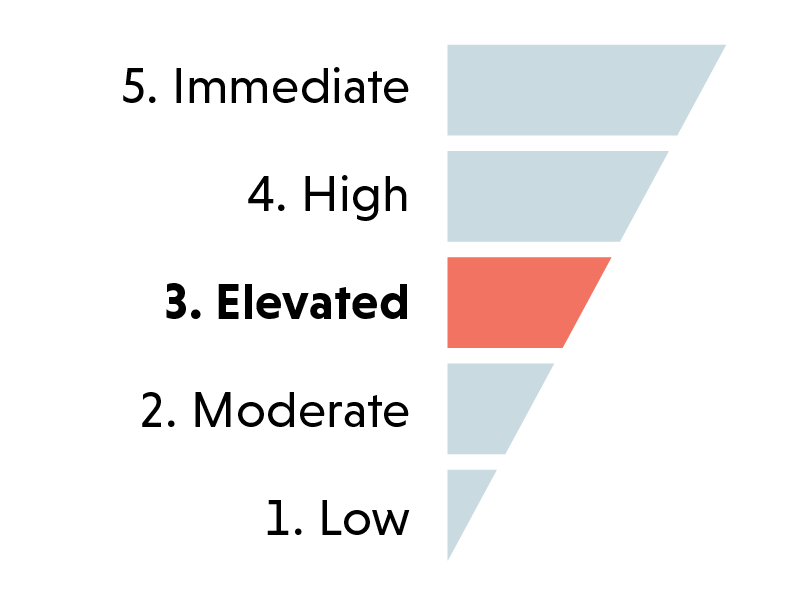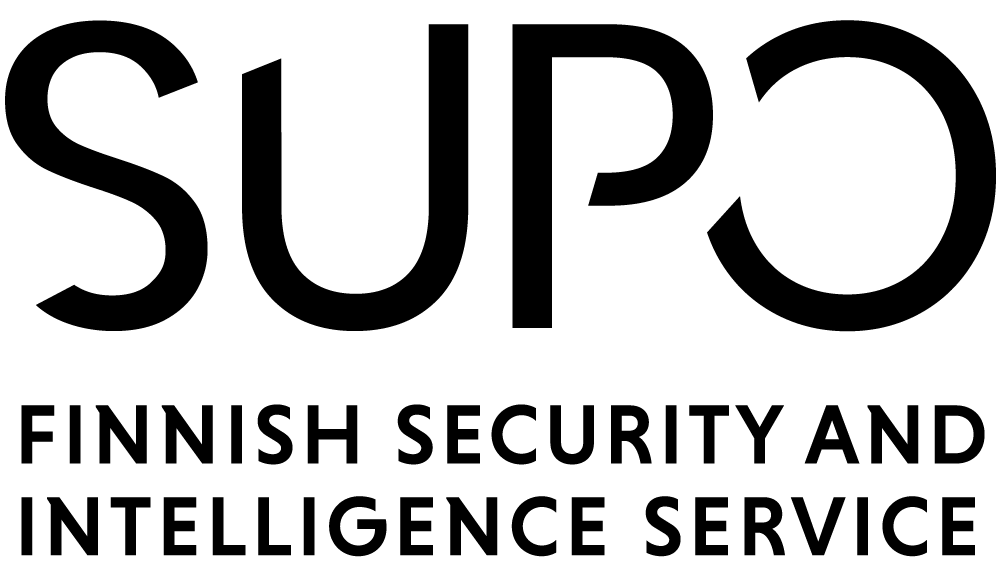National Terrorism Threat Assessment 2025
The threat of terrorism is at level three (elevated) on the five-point scale. There are far-right and radical Islamist operators in Finland with the desire and capacity to carry out violent attacks. The most likely threat of a terrorist attack continues to come from lone operators or small groups advocating these ideologies.

The threat of far-right and radical Islamist terrorism is at level three (elevated) on the five-point scale. This represents a slight increase compared to the previous threat level. In recent years, several trends have been observed in the Finnish security environment that increase the threat of terrorism. Supo introduced a new five-point terrorism threat level scale in 2025.
The most likely threat of attack continues to come from lone operators or small groups advocating far-right or radical Islamist ideology. There are individuals in Finland with the motivation and capacity to mount a terrorist attack. The threat of other terrorism is minimal.
Terrorist attacks in Western countries are also likely to inspire such incidents in Finland. Extremist propaganda internationally stresses individual population groups, such as ethnic, religious and sexual minorities, together with public authorities and policymakers. The terrorism threat level in Finland is also affected by an escalation of conflict in the Middle East that has activated representatives of various extremist ideologies in Europe.
Online radicalisation of young adults and minors is a key international trend. This is also visible in Finland, both in radical Islamist and far-right contexts. Radicalisation of young adults and minors will probably be reflected in the near future also among individuals who are targets of counterterrorism work. A growing general interest in violence has been observed in the radicalisation of young adults and minors, which is also noticeably occurring at an accelerating pace.
Networks are crucial to far-right activity
The number of far-right counterterrorism target individuals in Finland has grown in the 2020s. While primarily interested in firearms and explosives, far-right terrorists also use simple improvised means, such as bladed weapons. Their most likely targets are ethnic, religious and sexual minorities, together with parties who are viewed as ideological opponents, such as politicians or public authorities.
While the organised far-right movement poses no direct terrorist threat in Finland, it can serve as a platform for radicalising individuals and small groups, and for ideologically motivated violence. Some right-wing extremists in Finland have shown interest in acquiring firearms and explosives, and in learning how to use them. This interest in weaponry arises partly from an idea of preparing for a collapse of society that the ideology envisages.
Far-right counterterrorism target individuals are typically young males with an interest in violence, of whom some have problems of mental health and life management. Far-right rhetoric stresses the threats experienced by the white population, preparation for social instability and warlike conditions, inspiration drawn from attacks that have gained prominent media visibility, and the glorification of terrorism online.
The internet is crucial to far-right activity. Some Finnish people, including minors, actively participate in discussions that glorify violence. Several plotted attacks, both in Finland and internationally, have been linked to an online Siege culture that advocates the use of political violence to overthrow the present social system.
International trends amplify the threat of radical Islamist terrorism in Finland
The most likely radical Islamist terrorist attack will be mounted in a public place using unsophisticated instruments. International radical Islamist propaganda calls for violence, especially against parties that are understood as hostile to Islam. These targets represent Christianity, Israel, Judaism, and sexual minorities. While terrorist organisations in conflict areas are still seeking to mount and promote attacks in Western countries, a large-scale attack in Finland remains unlikely.
Radical Islamist activities in Finland still focus mainly on supporting international terrorism by such means as producing and disseminating propaganda, raising funds and enlarging support networks. Some international trends that also increase the threat of radical Islamist terrorism to Finland and Finnish interests have emerged over the last two years.
Desecration of the Quran, and especially expanded conflicts in the Middle East have served as radicalising and mobilising factors in the European radical Islamist context. The changes have been reflected in such outcomes as an increase in terrorist attacks and aborted attack plots.
Networks of the Islamic State (ISIL) terrorist organisation and its Afghan province (ISKP) have become more active in Europe and neighbouring regions. Radical Islamists of Central Asian and Caucasian origin are particularly highlighted in the international activities of this group.
The Finnish National Bureau of Investigation (NBI) launched an ISIL-related preliminary investigation last autumn into participation in the activities of a terrorist group. KRP managed to track down these suspects thanks to information gathered by Supo, which has continued providing specialist support to the investigation.
ISIL, al-Qaeda and the groups that swear allegiance to them continue to pose the most important terrorist threat globally. These organisations have exploited symbolically significant events in their propaganda, making increased calls for attacks on Western countries. The threat posed by terrorist organisations mainly focuses on unstable regions of Africa, the Middle East and South Asia, to which these organisations also seek to attract foreign fighters.
ISIL has continued its terrorist operations in the conflict zone of Iraq and Syria, and has sought to inspire, support and mount terrorist attacks in Europe. The ascent of the radical Islamist Hayat Tahrir al-Sham (HTS) to power in Syria and the instability that this has caused will probably give ISIL greater freedom to operate in the region. The broader impact of the change in Syria and beyond will only become apparent over a longer period.
One individual who left Finland for the conflict zone in Syria and Iraq returned in 2024. There are still about 50 people from Finland in the conflict zone, and while most have probably now perished, these deaths have not been confirmed due to the conditions prevailing in the region.
The threat of other terrorism is minimal
The threat to Finland from other forms of terrorism remains low. The activities of the far-left in Finland are mainly non-violent, focusing on supporting Kurdish activists and radical anti-fascism. Some individuals on the far left nevertheless remain ready for violent action. Violence is particularly evident in clashes with far-right demonstrators. The Finnish operations of the Kurdistan Workers' Party (PKK) terrorist organisation mainly focus on support work.
Far-left attacks in other European countries have targeted businesses and the public sector. While sabotage of infrastructure is a typical measure of far-left terrorism, violence also occurs at demonstrations, and is primarily targeted at perceived enemies, such as political opponents and public authorities.
